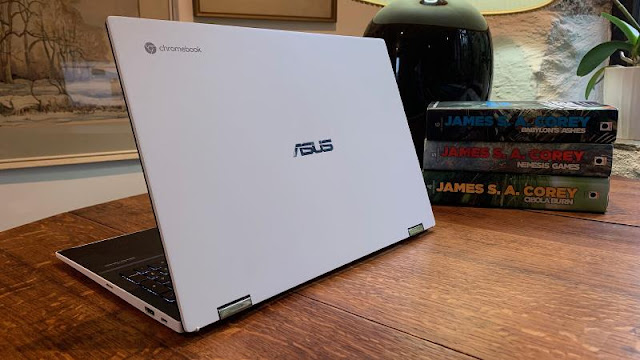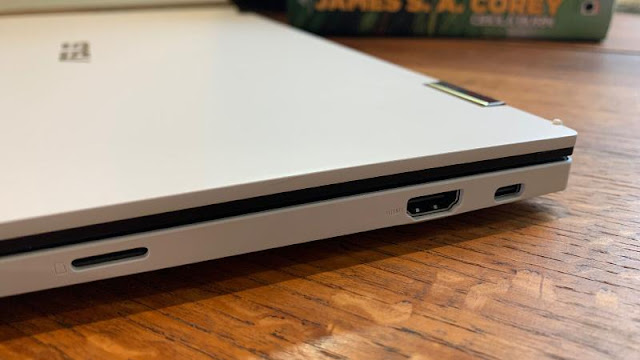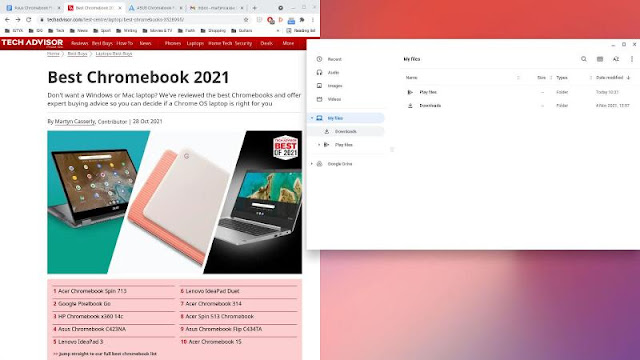For those who prefer a larger screen when working on a Chromebook, the new Asus Flip CX5 could be a compelling device.
Should I Buy The Asus Chromebook Flip CX5 (CX5500)?
Pros
- Large display
- Good battery life
- Fast performance
Cons
- Dim display
- Rough edges on faceplate
- Cramped number-pad
Our Verdict
Price When Reviewed
- From $699.99
Chromebooks have typically settled into the 13in space, with occasional smaller devices offering increased portability. This means that those looking for a larger laptop have been left with little to choose from over the past few years, but Asus has stepped into the breach with its new Flip CX5 that boasts a generous 15.6in display.
Design & Build
- 358 x 24 x 19mm dimensions
- 1.95kg weight
- Aluminium lid and plastic base
As you might expect, the Flip CX5 (CX5500) is a bit of a beast. I’ve reviewed many Chromebooks recently, and the pattern is towards sleek, lightweight devices. Asus throws this out the window and delivers something quite different.
The expansive 358 x 24 x 19mm chassis is easily the biggest I’ve encountered for a device running Chrome OS, not to mention the hefty 1.95kg at which it tips the scales. This is not your typical, chuck it in your backpack and forget about it Chromebook, but that’s by no means a bad thing.
With so many of us working more from home in these days of Covid, having a honking big laptop isn’t really an issue as we only have to carry it from the kitchen to the front room. Plus, a bigger display might help with tired eyes and sore necks that arise from being hunched over smaller screens.
The design itself is quite attractive, though, with the aluminium alloy lid covered in a material that Asus states gives it ‘an elegant, ceramic-like texture for a gentle, simple aesthetic’.
Between these, on the rear edge of the CX5, is home to a long line of rectangular openings for the internal fans to expel air, making it look something like an enormous harmonica, while the underside features more grilles for ventilation and the twin downward-firing speakers.
Rubber feet ensure grip while on a desk, aided by the weight of the device itself. Yes, it’s big, but the CX5 has a modern, minimalist appeal that will no doubt find favour with those bored of the continuous silver laptops that dominate the landscape at the moment.
Keyboard & Trackpad
- Full-size, backlit keyboard
- Number pad
- Good trackpad
The extra space on offer means Asus has been able to not only fit a full-size backlit keyboard, but it’s also sandwiched in a number-pad area. This is a little cramped, with thin buttons, and to be honest, seems something of a fudge.
The main keyboard is comfortable to type on, with decent travel meaning you know when you’ve hit the keys. But due to the number-pad, it’s offset rather than directly under the display, which while not unusual for this kind of layout, just feels wrong for a Chromebook.
Plus, the number-pad itself isn’t that easy to use due to the smaller keys, so it doesn’t fully justify the inclusion. To be honest, attaching a USB number-pad would be a better solution and would make the CX5 a much nicer device to use but that is a another thing to carry around.
The trackpad, again offset to the left, is smooth and spacious, with decent click responses and general accuracy. It’s hard to find a bad trackpad on Chromebooks these days, and this certainly doesn’t change that story.
There are also two rubber strips, obviously there to keep the display from touching the keyboard, which also can graze against the skin, although not while you’re typing. It’s not something I’ve encountered recently with laptops and does suggest that over time the join could open up, which would allow dust and debris to enter the device. Plus, it just adds a little discomfort to using the machine. It’s not painful or anything like that, but feels cheap and poorly designed.
Also, the black faceplate is a nightmare for fingerprints, with the matt-surface picking them up instantly as soon as you touch it. I noticed shiny areas appearing on the palm rests and some of the keys too, after only a few days’ use. This would suggest that the surface could wear quickly, leaving it a two-tone aesthetic of shiny and matt areas in no time at all.
Screen & Speakers
- 15.6in Full HD IPS
- Thin bezels
- Touchscreen
Now, the reason for this wealth of metal and plastic is the 15.6in screen that greets you when you open the lid. Asus calls this a NanoEdge display due to the thin bezels that run along the two flanks of the IPS panel and the slightly fatter on across the top that has to accommodate the 720p webcam, which gives the CX5 an 81% screen-to-body ratio.
Thankfully, you do have quite a wide range of angles to choose from, as the hinges on the CX5 work through 360 degrees, allowing you to use the device in the standard laptop mode, stand it up in tent mode for watching movies on the 16:9 aspect ratio widescreen display, or wrap it right round to form a tablet-style device, albeit one that’s unwieldy and far too heavy to use for long.
You can use a compatible USI 1.0 standard stylus to make notes, annotate documents, or doodle away on one of the apps that support such behaviour. It’s also a nice way to navigate around the operating system if you fancy a change. Yes, there’s not a whole lot of crucial activities you can do with the stylus, but it doesn’t hurt that you have that as an option.
Below the keyboard you can see the logo ‘Sound By harman/kardon’ which is a good sign. This is backed up when you listen to music or stream video on the CX5 as the volume is loud, easily filling a room, while avoiding being shrill.
Specs & Performance
- 11th-gen Intel Core i3
- 8GB RAM
- 128GB PCIe SSD
My review model is equipped with an 11th generation (Tiger Lake) dual-core Intel Core i3-1115G4 processor clocked at 3GHz that can boost to 4.1GHz. Tiger Lake chips launched back in the Autumn of 2020, and we haven’t seen many in Chromebooks so far, with the CX5 and HP Chromebook X360 14C being the only two yet to arrive in our testing lab so far.
This is paired up with 8GB LPDDR4 and 128GB M.2 NVME PCIe 3.0 SSD, which is plenty of space for a Chromebook, as the majority of data and software is intended to be stored in the cloud. To facilitate this, Google gives you 100GB of free storage on its Google One Cloud service for one year, by which time you’ll know how best to use the platform.
Playing games was a mixed bag. PUBG worked well, with responsive controls and a decent frame rate, but as I’ve seen with other Chromebooks, the detection of the Android emulator caused problems, with the game periodically throwing me out.
Trying the gentler Alto’s Odyssey was a disappointment, as the game stuttered so badly it was completely unplayable. I’m assuming this is due to the Android emulator once more, so if you’re considering buying the CX5 as a gaming machine you may want to stick to services like Google Stadia (for which you get a 3-month free trial included with the CX5) and Nvidia GeForce Now which both work on Chromebooks.
For those who like benchmarks, the CX5 attained 1123 (single-core) and 2505 (multi-core) on Geekbench 5, 1114 in Basemark 3.0, and 149 on Jetstream 2. This puts it top of the list in terms of scores, making it the fastest Chromebook I’ve encountered so far.
Should you want to boost those scores even further, then you can opt for the Core i5 or Core i7 versions that come with a maximum of 16GB of RAM and 512GB of storage. But, I think it’s safe to say that this Core i3 configuration should be enough for most users.
Ports & Connectivity
- 2x USB-C
- HDMI
- microSD
For such a large device, you might expect a huge selection of ports, but Asus has been somewhat restrained in this area.
You do get two USB-C ports, one USB-A, 3.5mm headphone jack, a microSD slot, plus a HDMI port. It’s a good range of options that should suit most people’s needs, and you can always attach a USB hub if you need more connections.
Battery Life
- 57Wh Li-ion battery
- 45W apapter
- USB-C Charging port
Buried in the chassis of the CX5 is a 57Wh Li-ion battery that delivers a decent level of endurance for the laptop. In our standard streamed HD video loop test, the Chromebook went from 100% down to zero in around nine hours and forty minutes.
That’s a respectable result, which should easily see you last throughout a full-working day without needing to be near a power socket.
Should you manage to exhaust the battery, then plugging the 45W AC adapter into one of the USB-C charging ports for thirty minutes will return you to 45%, while the whole charge is replenished in around one hour and fifteen minutes.
Software
- ChromeOS
- Offline capabilities
- Online versions of popular software
If you’ve read this far then I’m presuming you already know what a Chromebook is. If not, then it’s a laptop that runs on Google’s ChromeOS operating system. This is primarily focused on the web, with most of the programs you use all being online versions.
You won’t get the full-fat Word or Photoshop experience, although you can use stripped back iterations. Instead, the Google suite of office tools and the Chrome browser itself opens up a huge amount of capabilities for these modern machines.
If you don’t use pro-level applications or have very specific software needs, then you’ll most likely find a Chromebook can do everything you want, all with the security that viruses and malware are a much lower risk than on a Windows PC.
You can also use a range of the apps when you’re offline, such as Google Docs, which will then sync up any changes when you reconnect to a network. For more explanation on what you can do with a ChromeOS device, read what is a Chromebook and should I buy one?
Price & Availability
Asus offers the Flip CX5 CX5500 Chromebook for £649.99 in the UK, but at the time of writing you could only get the Core i5 version with 16GB of RAM in the USA, with a price tag of US$869.99 or US$892.99 at Insight.
Of course, the Flip CX5 is available from a number of other retailers, with Argos and Very pricing it at £499.99 in the UK. John Lewis has it for the same price or the Core i5 for £599.99. Over at Amazon you can get a free FitBit Inspire 2 for £557.98.
In the US, Newegg has it for US$683 (shipping from Canada) and Amazon only has the similar CX5400 at US$724.99 at the time of writing. Meanwhile, Best Buy has an identical looking device, although called the 'C536EA', for an amazing US$469.99.
This puts it in the same bracket as the excellent HP Chromebook X360 14cc, which again costs £599.99 in the UK or US$519.99 directly from HP USA, and Google’s own Pixelbook which you can pick up for £629/US$649.
To see the other devices vying for the top spot, be sure to take a look at our guide to the best Chromebooks.
Verdict
The Asus Flip CX5 Chromebook is a mixed bag. Its Tiger Lake processor ensures that things run fast and smooth for the vast majority of activities, although I did experience some odd problems with some games.
Battery life is also good, with around ten hours from a single charge, plus the large screen is a nice size for working on documents, spreadsheets and streaming content.
That being said, the screen is too dim to use outside on a bright day, plus the reflective nature of touchscreens can also cause problems in that environment.
While the keyboard is decent, the small keys on the number pad make it feel too compromised to be useful, especially when it spoils the Chromebook ethos of simplicity by skewing the design off to one side.
Worst of all is the rough edges around the edges of the keyboard plate, which feel like a weak point in the construction and could quickly become an issue.
If you want power and a large screen, then the Flip CX5 delivers, but it does so with some curious caveats. One to try before you buy if you can.
Specs
- Chrome OS
- 15.6in IPS FHD display (1920 x 1080), 16:9, 250 nits maximum brightness, 81% screen to body ratio, touchscreen, stylus compatible
- Intel Core i3-1115G4 Processor 3GHz (6M Cache, up to 4.1 GHz, 2 cores)
- Intel UHD Graphics
- 8G LPDDR4 on board
- 128GB M.2 NVMe PCIe 3.0 SSD
- 1x USB 3.2 Gen 2 Type-A
- 2x USB 3.2 Gen 2 Type-C support display / power delivery
- 1x HDMI 2.0a
- Micro SD card reader
- Backlit Chiclet Keyboard with Num-key, 1.4mm Key-travel
- 720p HD camera
- Dual harmon/kardon speakers
- Wi-Fi 6
- Bluetooth 5
- 57WHrs, 3S1P, 3-cell Li-ion battery
- Titan C Security Chip
- 358 x 24 x 19mm
- 4.3lbs/1.95kgs












0 comments:
Post a Comment